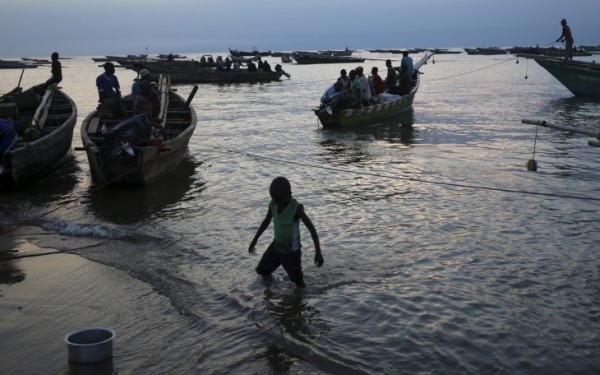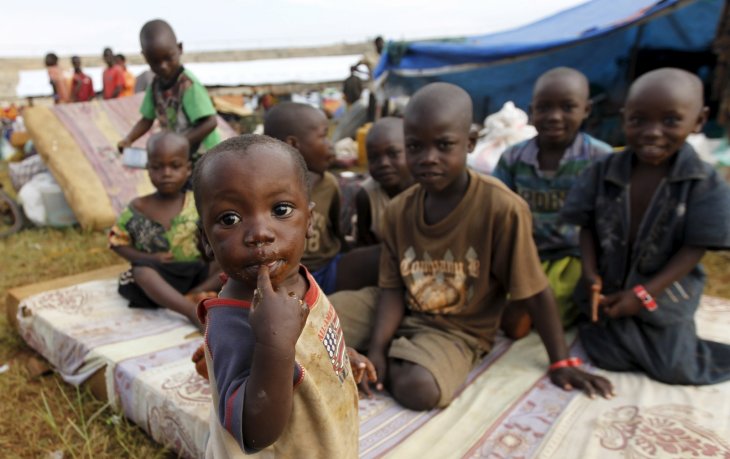PBS: Escaping Eritrea … [Read More...] about ካብ ውሽጢ ቤት ማእሰርታት ኤርትራ
The American surgeon planning a €27m floating hospital on Lake Tanganyika
Lake Tanganyika is the largest and deepest of Africa’s great lakes, and the longest lake in the world. The brilliant surface extends like a stretch of ruffled satin, a vivid kingfisher blue, and its extreme depths (almost a mile in some places) hold a fifth of the globe’s accessible drinking water, so fresh it tastes sweet. Four countries share its shores: Tanzania, Zambia, the Democratic Republic of the Congo and Burundi. It’s famous for its natural beauty, luminous cichlids and spectacular inaccessibility: infrastructure around Lake Tanganyika is almost non-existent.

My 12-seater bumped down at Sumbawanga airport, a corrugated-iron building with a dirt runway. The lake was still a three-hour drive away through sparse mud-brick villages. Tight-lipped women lined the rice and cassava fields with impossible loads on their heads: plastic sacks of grain, bundles of branches and tubs of water. In rural Tanzania, the women work hard. They till the fields, fetch the water, chop firewood, cook meals and bear children.
Dr Amy Lehman, a surgeon from Chicago on the shores of Lake Michigan, saw this when she was marooned beside Lake Tanganyika in 2007 after a typhoon washed away her shoreside airstrip. She was fatefully struck by the hardships facing the 12 million people in the lake’s drainage basin.
The area has one of the highest population growth rates in the world, extremely poor public healthcare provision and frequently unstable politics; Lehman calls it “the most geopolitically significant place you’ve never heard of”. Determined to raise international awareness, she founded an NGO, the Lake Tanganyika Floating Health Clinic (LTFHC), and had a giant map of the lake tattooed down her back so that it travels with her around the globe.
The founding dream of the organisation is to build a €27m hospital ship, a clinic that will float on Lake Tanganyika and provide healthcare to lakeshore communities, with operating theatres, specialist wards and education facilities. Travelling by water, it will circumvent the inadequate roads and remain flexible during unpredictable periods of violence. So far, they don’t have the money. For now, they are providing medical care on land, such as the outreach project in the shoreside village of Kirando that I went to see.
This two-week clinic, sponsored by Hivos International, aimed to address the intolerably high maternal-fetal death rate in the Rukwa region of Tanzania. It was going to offer free long-term contraception, train local health workers to insert implants and intrauterine devices (IUDs), and educate the community about family planning. Births in these remote areas are usually unattended and frequently result in the death of both mother and child. Contraception is controversial because it empowers women in a patriarchal society, albeit one that is becoming less so. Many women keep contraception secret from their husbands, and choose implants and IUDs because they’re less conspicuous than pills, patches or indeed condoms.
The clinic launched with a festival on the dusty Kirando football field. Kate McLean, the LTFHC chief programme officer, was there with fellow obstetrician gynaecologists Laura and Anna from the US, Georgie from the UK and Marietta from Mwanza on Lake Victoria. After the doctors were introduced, local actors put on a modern morality play. A witch doctor with a crown of feathers and swags of cowrie shells roared in from stage right, scattering terrified children. Rukwa was once famous for its witchcraft and 80% of people still turn to traditional healers before seeking medical attention. In response, a doctor listed the forms of contraception available to a long-suffering mother. “Give me all of them,” she said to laughter from the women in the crowd.

Kirando Health Centre is extremely basic. Goats and chickens wander between low concrete walkways and ward-buildings, and the resident doctors don’t hold medical degrees. Before the clinic could begin, the team was presented with an emergency: a pregnant woman had been admitted the night before. She needed an urgent Caesarean section, but her blood had stopped clotting; surgery could lead to catastrophic bleeding.
Kirando does not store blood so the woman’s family were pressed into donating. Speed was essential, however: the woman’s high blood pressure had probably killed the baby already, and the doctors couldn’t hear a fetal heartbeat.
The team scrambled to assemble the necessary surgical equipment. Emergencies are not wholly unexpected on Lake Tanganyika: a week before I arrived, violence had broken out in Burundi following General Niyombare’s failed military coup and more than 100,000 refugees had fled across the border; boats on the Lake had mobilised at short notice to help the refugees cross into Tanzania. Lehman was in Washington DC lobbying for funds and half the LTFHC team were working on the relief effort in Kigoma.
Kate and Laura pulled on scrubs and white wellies. They had no dedicated anaesthetic team and no paediatric unit. They had no eye-masks, so they improvised and wore sunglasses. Looking like surgical rock stars they stepped into theatre and closed the door. Anna stood ready to resuscitate if there was any hope of saving the baby.
A crowd of women had started to gather, and Georgie and Marietta began the triage process with them. All the women had children already; one in her mid-thirties had nine. The contraception¬
clinic had been advertised in villages, over the local radio station, and by a man riding a piki piki motorbike with a loudspeaker, and it was clearly going to be popular. In another building, Tanzanian Ministry of Health officials were training 10 new healthcare workers who would soon be joining the LTFHC team.
Several successful IUD implants later, the theatre door opened and Anna came out cradling a bundle of cloth: it was twins, a boy and a girl, both alive and healthy, and against the odds the mother was recovering well; at the critical moment her supplemented blood had started to clot. It was a dramatic start to the clinic and a visceral reminder of the dangers of childbirth; a few days earlier and three lives might have been lost.
It was a powerful experience and, on my last day with the clinic, I stood on the shore and reflected on the past and future of the lake. British, Belgian and German forces battled here in the First World War; Che Guevera camped on the far shore in 1965, training Congolese guerrilla fighters; this was also where the trader Kurtz set himself up as a demigod among the lakeside people in Joseph Conrad’s Heart of Darkness.
The LTFHC will continue to develop health systems around the shoreline as it builds its hospital ship. The Kirando clinic was an overwhelming success: the healthcare workers were confident and competent, and more than a hundred grateful women from villages across the Rukwa region had had implants inserted.
During my visit a mother called by to introduce Caesar, her four-year-old son. In 2011, Kate had delivered Caesar during another emergency Caesarean section, and now he sat on her lap, alive and well.
